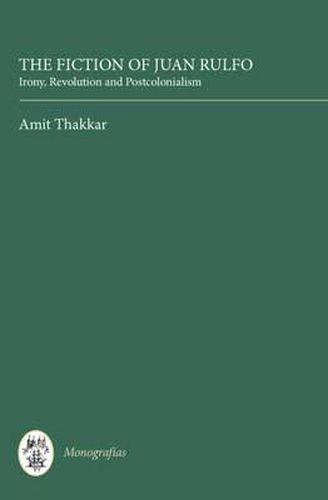Readings Newsletter
Become a Readings Member to make your shopping experience even easier.
Sign in or sign up for free!
You’re not far away from qualifying for FREE standard shipping within Australia
You’ve qualified for FREE standard shipping within Australia
The cart is loading…






This is the first extended, English-language study to focus exclusively on the fiction of Juan Rulfo in over twenty years. It contains innovative analyses of a selection of short stories from Rulfo’s collection, El llano en llamas (1953). It also examines in great depth two of the main characters of Pedro Paramo (1955), Rulfo’s masterpiece and only novel.
The book shows how Rulfo’s works can be read as exercises in irony directed againstthe rhetoric of post-Revolutionary Mexican governments. It also demonstrates the relevance of certain legacies of colony in Rulfo’s use of irony. Successive Mexican governments promoted a vision of post-Revolutionary society founded on specific notions of ethnicity, family, nation, education, religion and rural politics. The author combines examination of the speeches, images and newspaper articles which disseminated this vision with incisive literary analyses of Rulfo’s work. These analyses are informed both by his original theory of irony, based on internal and external referents, and by existing postcolonial theories, particularly those of Homi K. Bhabha.
Amit Thakkar is a Lecturer in Hispanic Studies at Lancaster University.
$9.00 standard shipping within Australia
FREE standard shipping within Australia for orders over $100.00
Express & International shipping calculated at checkout
This is the first extended, English-language study to focus exclusively on the fiction of Juan Rulfo in over twenty years. It contains innovative analyses of a selection of short stories from Rulfo’s collection, El llano en llamas (1953). It also examines in great depth two of the main characters of Pedro Paramo (1955), Rulfo’s masterpiece and only novel.
The book shows how Rulfo’s works can be read as exercises in irony directed againstthe rhetoric of post-Revolutionary Mexican governments. It also demonstrates the relevance of certain legacies of colony in Rulfo’s use of irony. Successive Mexican governments promoted a vision of post-Revolutionary society founded on specific notions of ethnicity, family, nation, education, religion and rural politics. The author combines examination of the speeches, images and newspaper articles which disseminated this vision with incisive literary analyses of Rulfo’s work. These analyses are informed both by his original theory of irony, based on internal and external referents, and by existing postcolonial theories, particularly those of Homi K. Bhabha.
Amit Thakkar is a Lecturer in Hispanic Studies at Lancaster University.